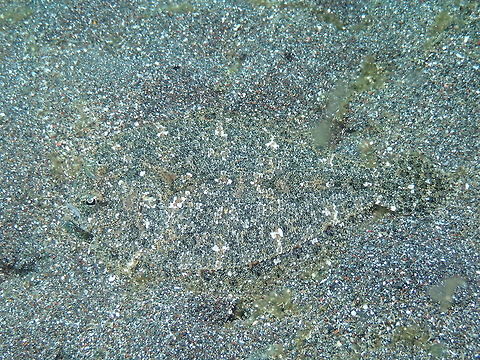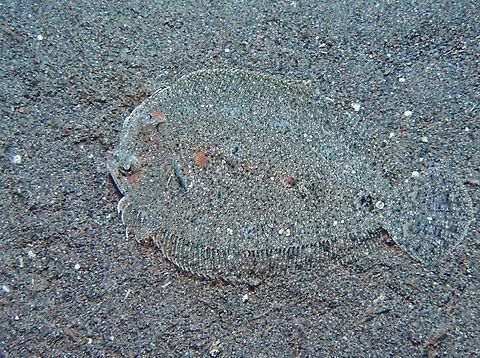
Appearance
Max Length: 5.9 cm. Dorsal spines (total): 0; Dorsal soft rays (total): 76-85; Anal spines: 0; Anal soft rays: 58 - 63. Males with ocular flap on each eye, red-spotted, and with a smooth, indented or scalloped margin; with orbital spines and a rostral spine on ocular side; are darkly pigmented on blind side. Sexual dimorphism in 3 morphometric characters exists: interorbital width, length of pectoral and pelvic fins on ocular side. Gill rakers elongate. Ctenoid scales on ocular side, cycloid on blind side. 2nd pectoral fin ray of ocular side much longer than the rest.
Naming
The scientific name of the species was originally Scaeops macrolepis and was first validly published in 1908 by Charles Tate Regan. The species was found in Cargados Carajos during the Percy Sladen Trust Expedition to the Indian Ocean in 1905.Parent
Engyprosopon Günther, 1862
Orig. name
Scaeops macrolepis Regan, 1908
Synonymised names
Scaeops filimanus Regan, 1908 (synonym)
Scaeops macrolepis Regan, 1908
Distribution
Indo-West Pacific: Red Sea to Maldives and Cargados Carajos; north to Taiwan, Philippines and the Coral Sea.Status
Least Concern.Habitat
Marine; demersal; depth range 3 - 91 m. Inhabits muddy and sandy bottoms, occasionally in vicinity of reefs,References:
Some text fragments are auto parsed from Wikipedia.
http://www.marinespecies.org/aphia.php?p=taxdetails&id=219804https://www.fishbase.se/summary/5344
https://nl.wikipedia.org/wiki/Engyprosopon_macrolepis
https://www.iucnredlist.org/species/69744004/69745335